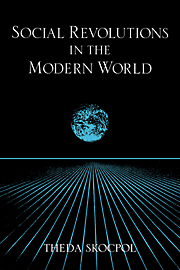Book contents
- Frontmatter
- Contents
- Acknowledgments
- INTRODUCTION
- I DOING MACROSCOPIC SOCIAL SCIENCE
- 1 A critical review of Barrington Moore's Social Origins of Dictatorship and Democracy
- 2 Wallerstein's world capitalist system: A theoretical and historical critique
- 3 The uses of comparative history in macrosocial inquiry
- II MAKING SENSE OF THE GREAT REVOLUTIONS
- III A DIALOGUE ABOUT CULTURE AND IDEOLOGY IN REVOLUTIONS
- IV FROM CLASSICAL TO CONTEMPORARY SOCIAL REVOLUTIONS
- CONCLUSION
- Index
1 - A critical review of Barrington Moore's Social Origins of Dictatorship and Democracy
Published online by Cambridge University Press: 05 June 2012
- Frontmatter
- Contents
- Acknowledgments
- INTRODUCTION
- I DOING MACROSCOPIC SOCIAL SCIENCE
- 1 A critical review of Barrington Moore's Social Origins of Dictatorship and Democracy
- 2 Wallerstein's world capitalist system: A theoretical and historical critique
- 3 The uses of comparative history in macrosocial inquiry
- II MAKING SENSE OF THE GREAT REVOLUTIONS
- III A DIALOGUE ABOUT CULTURE AND IDEOLOGY IN REVOLUTIONS
- IV FROM CLASSICAL TO CONTEMPORARY SOCIAL REVOLUTIONS
- CONCLUSION
- Index
Summary
Social Origins of Dictatorship and Democracy: Lord and Peasant In the Making of the Modern World.
By Barrington Moore, Jr. Boston: Beacon Press, 1966.Many pay lip service to the classical tradition in sociology, but few indeed work in terms of its mandate – which calls upon social scientists to assess, from a comparative and historical perspective, the prospects for freedom, rationality, and democracy in a modernizing world. Of the intrepid few who do consciously carry forward the classical tradition, most elaborate theoretical leads from the enormous scholarly legacy of Max Weber. Barrington Moore, Jr.'s Social Origins of Dictatorship and Democracy is therefore all the more unusual and interesting because it is not only a work solidly within the classical sociological tradition, but also the product of a Marxist scholarly perspective. And, leaving aside the literature on imperialism, it is virtually the only well-elaborated Marxist work on the politics of modernization to which one can point.
Social Origins does not postulate one route to the modern world which must be taken by all countries. Nor does it assign the strategic political roles in modernizing revolutions to the bourgeoisie or the proletariat. Yet in deeper and more significant ways, Social Origins is a Marxist work. In it Professor Moore relies for theoretical sustenance upon the central conceptions of Marxist political sociology – “the conception of social class as arising out of an historically specific set of economic relationships and of the class struggle as the basic stuff of politics.”
- Type
- Chapter
- Information
- Social Revolutions in the Modern World , pp. 25 - 54Publisher: Cambridge University PressPrint publication year: 1994
- 3
- Cited by



